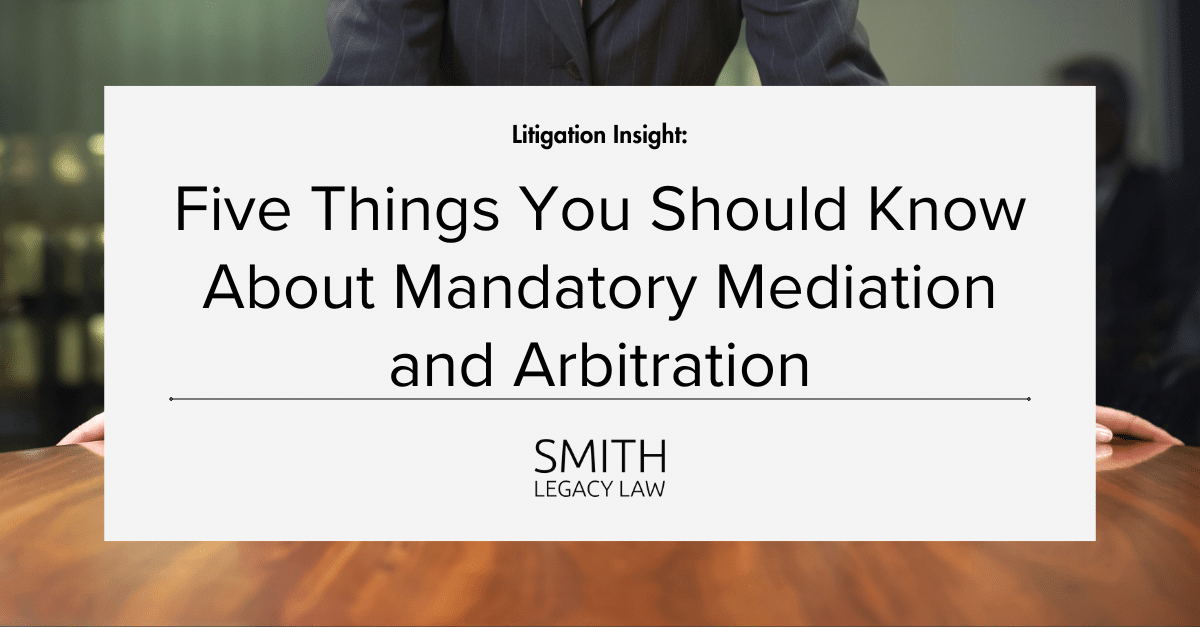Alternative dispute resolution (ADR) methods like mediation and arbitration serve an invaluable purpose in helping keep disputes out of court. Avoiding the time and expense of litigation saves the parties and judicial system significant time and money. As a result, parties should consider adding a mandatory mediation and arbitration clause to their contracts so if a problem arises, both sides are compelled to pursue ADR first. If you are contemplating whether to include a mandatory mediation and arbitration provision, there are five things you should know.
What Is Mediation?
Mediation is a non-binding out-of-court process whereby a neutral third party (the mediator) facilitates settlement discussions between the parties to a dispute. The mediator is trained to assist both parties in reaching a mutually acceptable compromise to avoid the need for a trial. The mediator does not make binding decisions and will not force the parties to settle.
What Is Arbitration?
Arbitration is also an out-of-court process. However, unlike in mediation, the neutral third-party arbitrator hears and decides the case. The proceedings are more similar to a court trial, although the claims are presented before a trained arbitrator rather than in a traditional court setting. Each side presents evidence to the arbitrator in support of their allegations. The arbitrator’s decision is typically binding on the parties and enforceable in court, with only limited judicial review of the decision.
When Is Mediation or Arbitration Mandatory?
Generally, there are three ways that a dispute may end up in mediation or arbitration.
- Contract provision. Many contracts include mandatory mediation and/or arbitration provisions. For example, when purchasing computers from a manufacturer, your contract with the manufacturer may contain a clause requiring that any claims you bring against the manufacturer must first be submitted to mediation. The contract may also state that in the event mediation is unsuccessful, the claims must then be submitted to binding arbitration.
- Consent of the parties. Both sides can agree to mediation and/or arbitration to keep their case out of court.
- Court order. A court may order certain claims or an entire case to proceed to mediation and/or arbitration, especially if there is an agreement or contract in place that requires it.
How Does Mandatory Mediation and/or Arbitration Impact Your Claims?
If you know that you must mediate or arbitrate your claims, your case strategy will be different than if you were commencing an action in court. Just as in civil court, there are unique procedures in place for both mediation and arbitration that an attorney can help you navigate.
Mediation and arbitration tend to be resolved quicker than disputes heard in the regular court system. There are fewer rules and typically less motion practice which speeds the case up. Your matter may proceed more efficiently and be completed sooner than if you litigated the dispute.
Your costs may also be less. With mediation and arbitration, there are fees to commence an action as well as fees for the mediator or arbitrator. However, a faster resolution often means lower costs overall. Note, however, that you or your opponent may be required to pay for the mediation/arbitration fees in the event you lose, depending on the language of your agreement or court order.
Do You Need an Attorney in Mandatory Mediation and/or Arbitration?
First, it is essential to have an attorney draft or review a mandatory mediation or arbitration provision, so it takes into consideration various factors like choice of law, venue, and other protections. In addition, if a conflict does arise, you want skilled representation in mediation or arbitration. Your attorney can help ensure compliance with any rules, develop an appropriate strategy, and advocate for your interests in negotiations and presenting your side before the mediator or arbitrator.
Our attorneys have extensive experience drafting ADR clauses and providing strategic guidance and advocacy in ADR proceedings. Contact us for a consultation.
